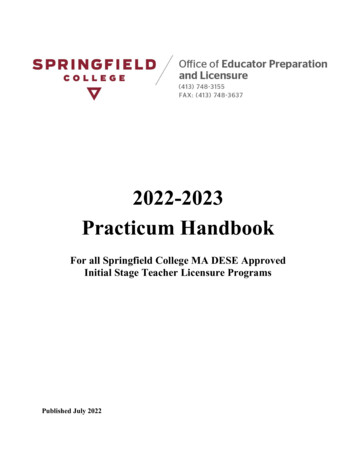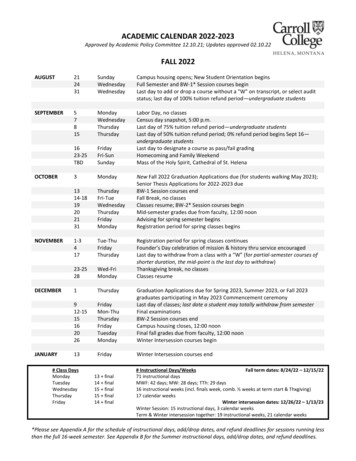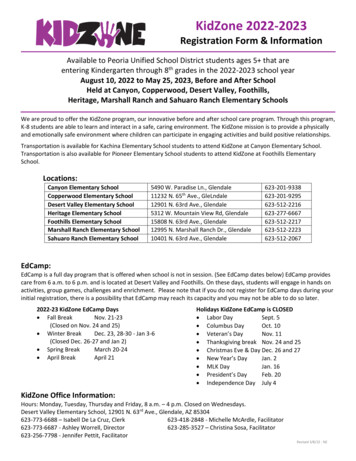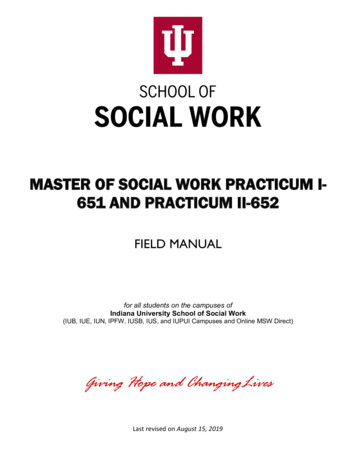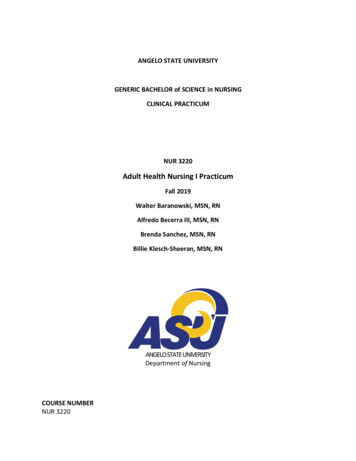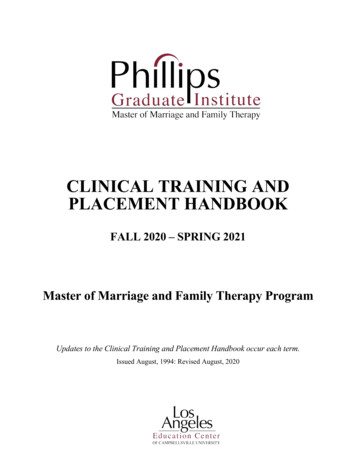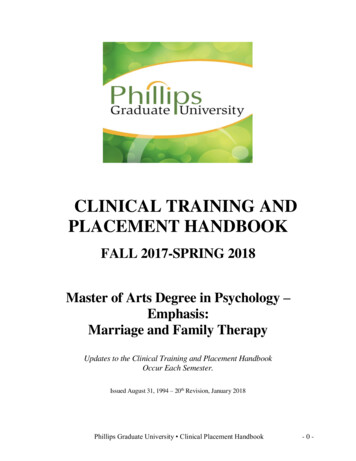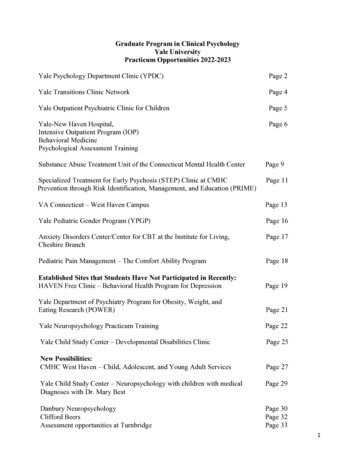
Transcription
Graduate Program in Clinical PsychologyYale UniversityPracticum Opportunities 2022-2023Yale Psychology Department Clinic (YPDC)Page 2Yale Transitions Clinic NetworkPage 4Yale Outpatient Psychiatric Clinic for ChildrenPage 5Yale-New Haven Hospital,Intensive Outpatient Program (IOP)Behavioral MedicinePsychological Assessment TrainingPage 6Substance Abuse Treatment Unit of the Connecticut Mental Health CenterPage 9Specialized Treatment for Early Psychosis (STEP) Clinic at CMHCPrevention through Risk Identification, Management, and Education (PRIME)Page 11VA Connecticut – West Haven CampusPage 13Yale Pediatric Gender Program (YPGP)Page 16Anxiety Disorders Center/Center for CBT at the Institute for Living,Cheshire BranchPage 17Pediatric Pain Management – The Comfort Ability ProgramPage 18Established Sites that Students Have Not Participated in Recently:HAVEN Free Clinic – Behavioral Health Program for DepressionPage 19Yale Department of Psychiatry Program for Obesity, Weight, andEating Research (POWER)Page 21Yale Neuropsychology Practicum TrainingPage 22Yale Child Study Center – Developmental Disabilities ClinicPage 25New Possibilities:CMHC West Haven – Child, Adolescent, and Young Adult ServicesPage 27Yale Child Study Center – Neuropsychology with children with medicalDiagnoses with Dr. Mary BestPage 29Danbury NeuropsychologyClifford BeersAssessment opportunities at TurnbridgePage 30Page 32Page 331
Yale Psychology Department Clinic (YPDC)The Yale Psychology Department Clinic provides mental health services to individuals from thegreater New Haven and Yale University communities. Traditionally YPDC has specialized inindividual and group treatment for adolescents and adults who have primary anxiety and mooddiagnoses. However, we also provide treatment for couples and families as well as Yale graduatestudents and post-docs who are seeking to participate in psychological skill building groups(cognitive behavioral therapy, dialectical behavioral therapy, acceptance and commitment therapy,etc.).Training in evidence-based assessment and treatment is emphasized. Learning of empiricallysubstantiated skills (e.g., exposure and response prevention, behavioral activation, problem solving,cognitive reframing, motivational interviewing, mindfulness, distress tolerance, interpersonal skillstraining, emotion regulation, family focused therapy, Gottman couples approaches, emotion focusedcouples therapy, etc.), attention to the therapeutic process (e.g., empathic listening, verbal andnonverbal expressiveness, process comments), and the development of case conceptualization, andtreatment planning (e.g., establishing a clear goal focus with clients and a plan for ongoingassessment of therapy) are emphasized. Graduate student clinicians video and audio record allsessions to aid in supervision.Clinicians conduct intake assessments with the Structured Clinical Interview for DSM-5,unstructured interviews, and client self-report questionnaires. They present findings gatheredduring intake assessments at weekly clinical conferences and in professional reports. Additionally,they function as co-therapists in a variety of group treatments: CBT, DBT, ACT, and Mindfulnessskills training. First year students may take on one client (depending on other obligations), secondyear students maintain a caseload of approximately 3 individual clients (or couples or families),and 3rd year students maintain a caseload of approximately 5 clients.Faculty aim to provide students with as much variety as possible in their caseload and offertraining from a variety of theoretical perspectives during the training years.Students attend group supervision meetings (1.5 hours per week) as well as individual supervisionwith a licensed clinical psychologist (1 hour per week). Additional supervision by a student directorcan be obtained if requested and available. The practicum begins September 1st and continuesthrough June 1st.Student Director: Advanced students in their 5th year of training may elect to apply for a studentdirector position. Student directors are an integral part of the clinic’s leadership. Responsibilitiesmay include providing peer supervision, attending weekly supervision of supervision meetings,attending weekly clinical conferences, serving as a teaching fellow for introductory clinical courses(such as Introduction to Diagnostic Assessment; Ethics, Diversity, Supervision, Consultation andProfessional Practice; Psychological Assessment), coordinating community outreach efforts andclinic recruitment, and carrying a caseload of clients.Recent Student Directors/Supervisors: Ava Casados, Dana Allswede, Ema Tanovic, LibbyLewis, Erica Ho2
Typical time spent on clinical work breaks down as follows per week:Individual patients3-5 hoursPreparation time1-2 hoursGroup2 hours(1 hour of group; 1 hour of preparation/supervision)SupervisionPaperwork2.5 hours1.5 hoursTotal10 - 12 hours3
Yale Transitions Clinic NetworkThe Transitions Clinic Network serves the primary care needs of recently released prisonersand their families. Each Transitions clinic is staffed by a culturally competent provider and acommunity health worker (CHW), with a history of incarceration, ensuring each patient’s mostpressing issues are addressed. We take a broad view of health and wellness, caring for boththe patients’ physical and behavioral health needs, and their social determinants of health.Starting September 2019, we added mental health services to our primary care clinic in NewHaven. These services are provided at no cost to patients. Services can take several formsincluding 30 min-45 min skills sessions (offered as one-time visits or weekly visits forcontinuing care), 20 min brief sessions to discuss motivations for change or psychoeducationabout mental health issues, diagnostic assessments (with integrated reports [SCID, Shipley IQ,WRAT-Reading, MoCA, PANAS]), etc. Patients seen in this practicum range in their presentingproblems, including general stress, trouble with transitions to the community, substance abuse,trauma, anxiety, psychosis, and depression. The Transitions Clinic Practicum runs on Fridaysfrom 8:30am-12:30pm. There is an additional hour of supervision each week (provided by Dr.Arielle Baskin-Sommers), and a monthly team supervision meeting (with Drs. Lisa Puglisi andBaskin-Sommers).To apply for this practicum, first, speak with the DCT to discuss your training goals andavailability. Then, reach out to Dr. Baskin-Sommers to set up an interview. No prior experiencewith incarcerated or formerly incarcerated individuals is required. That being said, it isessential that students working in this practicum articulate a desire to support this populationand a recognition of the sensitivities present for those that are justice-involved.Students who have recently participated in this practicum: Ariel Chang, Meghan Collins,Suzy Estrada, May Conley, Wisteria Deng, Elizabeth Kitt, Michelle Worthington4
Yale Outpatient Psychiatric Clinic for ChildrenMichele Goyette-Ewing, Ph.D.Associate Research Scientist in the Child Study CenterDirector, Psychology TrainingDirector, Yale Outpatient Psychiatric Clinic for ChildrenPracticum: @12 hours/weekDr. Goyette-Ewing is the director of the Yale Outpatient Psychiatric Clinic for Children. Theclinic sees 900 children each year, the majority of whom are from underserved and low-incomebackgrounds. Child clients range in age from 1-18, and present with the full range of symptomsand diagnoses.There are 10 full time treatment providers working at the clinic, and interns in clinical psychologycan opt to serve a rotation at the clinic as part of their internship training. The treatment providersare multidisciplinary, including psychiatric fellows, clinical nurse fellows, social workers, andpsychologists.There are two teams within the clinic. The young child team specializes in treating children 4.5years and below. That team tends to work from an attachment framework and to provide playtherapy, circle of security, and parent-child interaction therapy. The older child team treatschildren 5 and older, and offers a broad range of treatment including trauma focused CBT, andParent Management Training. They are currently providing Modular Approach to Therapy forChildren (MATCH – ADTC), a bold redesign of evidence-based treatment for childhood anxiety,depression, trauma, and conduct problems developed by Drs. Bruce Chorpita and John Weisz.http://www.practicewise.com/portals/0/MATCH public/index.htmlThis practicum placement would require participation in one grand round meeting series (held onMonday 10:30 – 12 or Monday 12-1:30), and the staff meeting (held on Wednesdays noon- 1PM).As part of the grand rounds, clinicians are required to present updates regarding their clinical workvery briefly (3-5 minutes). As part of the staff meeting there are longer case presentations, trainingin cultural competence, and invited speakers. There is also an evidence-based treatment seminarthat is offered on Fridays from 11-12.Trainees would be assigned up to 8 childrenStudents who have recently participated in this practicum: Ava Casados, Molly Crossman,Dana Allswede, Grace Brennan, Emily Cohodes, Camila Caballero, Meghan Collins, May Conley5
YALE SCHOOL OF MEDICINEDepartment of Psychiatry/ Psychology SectionYale-New Haven Hospital (YNHH)Psychology ExternshipsThe YNHH psychology externship program represents a part-time version of our doctoralinternship program. Externship training may occur in one of two training tracks:1. Adult Dialectical Behavior Therapy Program2. Adult Behavioral Medicine ServiceClinical placements provide a range of evidenced-based clinical training opportunities withinmultidisciplinary hospital-based settings serving patients with either serious mental and/or medicalillness. Externs receive training in multiple therapeutic modalities, including crisis intervention,individual therapy, group therapy, couples therapy, and in collaborative methods for pharmacologicintervention. Externs also have opportunitiesto receive training in psychological and neuropsychological assessment.I. Adult Intensive Outpatient Program (lOP) Dialectical Behavior Therapy (DBT) Program:The Adult lOP is geared for patients who do not require the level of supervision and supportprovided by an inpatient program, but who need more intensive intervention than is readilyprovided in most outpatient settings. Most patients are admitted for treatment of mood disorders,anxiety disorders, chronic suicidal ideation, co-occurring disorders (psychiatric and substanceabuse disorders), personality disorders and family/interpersonal conflicts. Patients are admitted toone of four main treatment tracks: 1) General for patients with depression, anxiety, psychosis andother psychiatric problems; 2) Dual diagnosis for patients with co-occurring psychiatric andsubstance abuse disorders; 3) Dialectical Behavioral Therapy-General {DBT-G) for patients withborderline personality disorder features who struggle with chronic patterns of suicidal or other selfdestructive behaviors; and 4) DBT for Substance Use Disorders (DBT-SUD} for patients whostruggle with borderline personality disorder features and substance dependence.Externs may participate in a multidisciplinary team by serving as primary clinicians in DBT-G orDBT-SUD tracks. The DBT and DBT-SUD tracks provide comprehensive DBT treatment asspecified by Marsha Linehan, PhD, with modification for a group-based day hospital setting. TheDBT tracks include skills training, diary card review, behavioral analysis, and skills coaching.Externs attend an in-depth weekly DBT seminar over the summer in order to develop familiaritywith the major principles, strategies, and methods of DBT that they will continue developingthroughout the training year. As the primary clinician, externs meet individually with their assignedpatients on a monthly and as-needed basis (e.g., for risk assessment and management, familymeetings), coordinate treatment with patients' concurrent outpatient providers, and providedischarge planning. The externs and other DBT clinicians provide telephone skills-coaching andmeet weekly for a DBT consultation group.Externs are trained to perform clinical admissions intakes, and as-needed psychologicalassessments. Externs may also have the opportunity to co-lead non-DBT group therapy and/orapply brief individual DBT depending on the extern's interest and clinical availability.6
For more information about this placement site, please see the description of the full-timeinternship placement education/predoc/sites/ynhh/adbt/Or contact Ashley Pierson, PhD (https://medicine.yale.edu/profile/ashley pierson) atAshley.pierson@yale.eduStudents who have recently participated in this practicum: Hanna Raila, Michael Vanderlind, MollyCrossman, Libby Lewis, Colin Stanton, Alli Stuppy-Sullivan, and Ashleigh Rutherford2. Adult Behavioral Medicine Service:The Behavioral Medicine Service is a psychological consultation and intervention programintegrated within specialized outpatient medical services of Yale-New Haven Hospital (YNHH)and the Smilow Cancer Hospital. Externs work within multidisciplinary teams of medicalproviders (consisting of physicians, surgeons, nurses, and social workers) and gain valuableexperience in the provision of behavioral health consultation, psychological assessment, andbehavioral health intervention to a broad range of medically ill patients. Emphasis is placed onunderstanding the psychosocial factors influencing adjustment and adaptation to chronic medicalconditions, and on developing skills for behavioral consultation and intervention in an academicmedical setting.The goal of the Behavioral Medicine Service is to provide support and assistance to medical careproviders and their patients so that the patient's emotional and mental health needs can beaddressed within the context of their overall medical care. The service operates under the premisethat integrated behavioral medicine has the potential to benefit both patient and physician byimproving access to behavioral health care for medically compromised individuals, improvingadherence to medical treatments, targeting lifestyle and psychosocial issues effecting wellness,addressing issues of pain management, stress tolerance, addictions, coping, and by helping toprevent the development of more serious mental health disorders through early recognition andintervention.Externs divide their time training between the Yale-New Haven Transplantation Center's LiverTransplant Program and the Smilow Cancer Hospital.Within each of the medical specialties, Behavioral Medicine Externs consult with medical providersand patients and provide psychotherapy to medically ill patients using a combination of supportive,cognitive behavioral, and mindfulness-based therapeutic approaches. Interns also attendand participate in a number of weekly multidisciplinary meetings and case conferences such as theLiver Transplant Recipient Review Committee, Melanoma Tumor Board, and the Palliative CareInterdisciplinary Team Meeting.Psychology externs at YNHH also have access to additional didactic opportunities such as weeklypsychology training seminars, departmental grand rounds, and hospital case conferences.For more information about this placement site, please see the description of the full-time internshipplacement at: ucation/predoc/sites/ynhh/bms/or e-mail Dr. Dwain Fehon, Chief Psychologist, Director Behavioral Medicine,dwain.fehon@yale.edu. Students who have recently participated in this practicum: VictoriaWebb, Erica Ho, and Annalise Perricone7
3. Psychological Assessment Training, Supervision & Seminars:Psychology externs at YNHH have the opportunity to conduct neuropsychological and psychologicaldiagnostic testing protocols within their primary placements. Psychology externs at YNHH receiveweekly individual supervision from Dr. David Klemanski (david.klemanski@yale.edu), as well asweekly individual supervision with a doctoral psychology fellow. In addition to formal weeklysupervision, a major form of supervision is provided "in vivo" via modeling, treatment teammeetings, and consultation groups.Educational Goals: Learn about different psychiatric presenting problems and develop an understanding of how theserelate to specific diagnoses; Learn about the application of a variety of assessment approaches to presenting problems anddiagnosis; Increase understanding and confidence with administering intelligence, achievement, personality,neuropsychological, and other objective instruments and measures; Enhance knowledge of psychometric properties of assessments and measures and outcome(s)monitoring; Develop skills related to providing assessment results and feedback to patients and families andtreatment teams; Learn about cultural backgrounds of patients and understand the connection between theirbackground and psychological problems; Increase cultural competence related to administration of tests and scoring and clinicalconceptualization of patient cases; Develop and appreciate knowledge of professional standards and ethics related to psychologicalassessments and psychometrics; Understand how providers refer patients for assessments and how results are used in treatmentand discharge planning;Educational Activities (clinical, research, in-service, rounds, etc.): Conducting structured and semi structured clinical interviews and mental status exams; Determining appropriate plans for assessments, including test selection, and in context of referralquestions and outcome needs; Observing and administering various assessment measures; Scoring, interpreting, and writing summaries of test results for comprehensive and brief integratedreports for patients and treatment teams; Observing, delivering, and reviewing assessment results with patients and their families andtreatment teams; Attend various trainings including on cultural competence and diversity, psychometric propertiesof measures, psychopharmacology, etc. Interact regularly with treatment providers within a large-scale health care system to ensure thepsychological and clinical needs of patients are met with regard to assessment;Type and amount of supervision: Individual, Group, and Ad-hoc supervision; 2.5 hours(minimum) – 4 hours (maximum) per week.Students who have recently participated in this practicum: Erica Ho8
Substance Abuse Treatment Unit (SATU)of the Connecticut Mental Health Center, 1 Long WharfMatthew Steinfeld, PhD Matthew.steinfeld@yale.eduThis practicum offers specialized training in the diagnosis and treatment of a range of substanceuse disorders, and how these disorders affect and interact with other mental illnesses andpsychological problems.Information about the experiences practicum students are offered can be found cum students experience roughly the same training as psychology interns, albeit inabbreviated form due to fewer hours at the clinic. SATU is staffed as a consortium between YaleUniversity School of Medicine's Department of Psychiatry and the State of CT.Currently there are 4 full-time licensed clinical psychologists on the SATU team:Donna LaPaglia, Psy.D., Primary AdvisorLisa Fucito, Ph.D., SupervisorMatthew Steinfeld, Ph.D., SupervisorBrian Kiluk, Ph.D., SupervisorThe SATU clinic historically has had 2 psychology internship slots per year as part of Yale'sPredoctoral Internship Program in Clinical & Community Psychology. Former psychologypracticum students have reported learning a lot from current interns and have regularly securednationally competitive internships.The practicum requires 12 hours/week (1.5 days). Ideally, practicum students would be at SATUon Wednesday mornings and Thursdays 9-5. Yale students could participate a bit longer onWednesdays to accommodate their need to participate in the clinical lunch series on Thursdays.There is an important required case conference at SATU on Thursdays at 4 PM. Most of the othertrainees (interns, postdocs, etc.) are around on Wednesdays and Thursdays and Dr. Steinfeld wouldlike students to have the opportunity to learn from each other.Training activities include: Intakes, case presentations during team meetings, 3-4 individualpatients per practicum student, supervision, and case conference with interns and postdocs. Thereare mindfulness based groups and acutox groups (that use acupuncture).Practicum students see the full range of substance use disorders in the clinic, and patients oftenhave co-morbid personality disorders, mood disorders, etc. Dr. Steinfeld described the clinicpopulation as consisting of "anyone who experiences life with drugs."At SATU practicum students will administer a semi-structured comprehensive interview that takesapproximately 60-90 minutes. Students will learn a great deal about conducting psycho-social lifehistory interviews. The intakes include breathalyzers, urine tox screens, blood pressure measurement,etc.Dr. Steinfeld describes the program as having an interdisciplinary team of psychiatrists, social9
workers, nurses, family therapists, and psychologists. He describes the team as pluralistic andoften engaged in lively debates and disagreements.If you are interested in this practicum, please reach out to Dr. Matthew Steinfeld in Decemberto express your interest and set up an interview.Students who have recently participated in this practicum: Liz Kneeland Tepe, Becca Boswell, RebeccaFortgang, Ema Tanovic, Alli Stuppy-Sullivan, Suzy Estrada, Ariel Chang10
STEP Practicum Placement InformationPosition description: This practicum position will be at the Specialized Treatment Early in Psychosis (STEP)Program at Connecticut Mental Health Center. The student will primarily provide clinical services withopportunities to participate in and/or conduct independent research and community outreach andeducation. Clinical responsibilities primarily include: providing family services, including education andsupport, as well as FFT-informed interventions to families and other support people of STEP patients.Practicum trainees will also have the opportunity to co-facilitate STEP Family Workshops and other groupinterventions. Other clinical opportunities may include the following: serving as the primary or adjunctivetherapist for patients in STEP, conducting diagnostic and psychosocial assessments, co-leading groups foryoung people and/or families, conducting educational workshops, and participating in the developing of newinterventions and treatment manuals. Training and supervision in specialty interventions is provided.STEP is currently providing a hybrid model of care, practicum students will be expected to provide servicesboth via Zoom and in-person.Time Commitment: 12 hours/week for 12 month period (typically July 1st – June 30th)Required Meetings (Currently via Zoom):-STEP Educational Rounds: (Mondays: 4-5pm)-Team Huddle (Group Supervision) (10-1030am, 2 day/wk)-Individual Supervision Meeting: Time TBDPrimary Supervisor: Laura Yoviene Sykes, PhD Laura.Yoviene@yale.eduApplication:Please email the following to Laura.Yoviene@yale.edu by December 15th- CV- Brief Cover Letter- List of 2 references11
Prevention through Risk Identification, Management, and Education (PRIME) at CMHCSupervisor(s): Scott Woods, PhD, scott.woods@yale.edu& Barbara Walsh, PhD, barbara.walsh@yale.eduOverview:The PRIME Clinic aims to prevent psychotic disorders through early identification of those at risk fordeveloping psychosis. Research aims to characterize the neurobiology of individuals with thepsychosis prodrome using diagnostic evaluations, genetics, neuroimaging, and electrophysiology,and conducting trials of medications and psychotherapy to prevent psychosis through earlyintervention. Residents in the PRIME clinic work with prodromal adolescents and young adultsthrough individual, couples or family therapy, and, at times, medications, to manage currentsymptoms and prevent conversion to psychosis.Training, Supervision, and Didactic opportunities Hours: Face-to-face intervention or assessment hours can be supplemented as needed whileparticipating fully at STEP. Individual psychotherapy sessions with adolescents/young adults at-risk for developingpsychosis.o Brief Supportive Psychoeducation (1hour/week; 3 sessions max)o PRIME vs Usual care RCT study: Participating as a clinician (1 hour/week, as needed) 30 mins/week Individual Supervision (Optional) Structured Interview for Prodromal Syndromes (SIPS) assessment (about 2 hours) (Optional) SCIT group co-facilitator for psychosis prodorme (about 1 hour, 20 weeks) (Optional) SCID for on-going studies. Report writing not required (About 1 hour/case). (Optional) Family focused therapy as needed. (Optional) Integrated psychological assessment report writing based on: SCID, SIPS, WASI2, WRAT4, Hopkins Verbal Learning Test etc.Students who have recently participated in STEP and/or PRIME: Yoonho Chung, Rebecca Fortgang,Michael Bronstein, Michelle Worthington, Will Koller12
VA Connecticut - West Haven CampusContact people: John Beauvais, Ph.D., Jennifer Doran, Ph.D., Ilan Harpaz-Rotem, Ph.D.VA Connecticut Healthcare System - West Haven Campus (VACHS) offers healthcareservices to a diverse population of veterans that are provided in a wide range of healthcaredelivery settings. VACHS provides primary, secondary, and tertiary care services in multipleareas (e.g., medicine, geriatrics, neurology, surgery, and mental health) and also providesspecialized services for specific clinical problems (e.g., blind rehabilitation, psychosocialrehabilitation for seriously mentally ill, geriatric rehabilitation, women’s health care,psychological and pastoral counseling, alcohol and substance abuse treatment). Several programshave been designated as Centers of Excellence (e.g., National Center for PTSD, MIRECC, andPrimary Care). Psychology staff members are directly integrated into many of these clinicalsettings, but also serve these populations on a consultative basis. Three internship tracks areavailable to graduate students depending on their interests and level of training; Clinical HealthPsychology, General Mental Health, and Clinical Neuropsychology.For more information about internship level training, please visit Psychology Training - VAConnecticut Healthcare ologytraining.aspThere are also practicum level training opportunities. The review process for VACHS –WH starts in the middle of January. Prior to this, we are busy processing the applications forour doctoral internship and fellowship programs. In December we start collecting CV’s andcover letters from interested students. We also survey our training staff to see who can takeon a student and in what training area. In the recent past we have had 10-12 applications for 23 practicum spots (most commonly in Telemental Health, Neuropsychology, or PTSD areas andsometimes in substance use, health psychology or SMI). We make offers to people that seem tobest fit our program. We do not typically interview practicum students, but some supervisorsprefer this option. We try to be as fair as we can be to all the people interested in a practicumwhen the demand far outstrips our resources. Finally, It is important to know that all practicumstudents must meet VA eligibility requirements: Eligibility - Psychology Training (va.gov)PTSD and Comprehensive Outpatient Mental Health Track:Experiences in this track include working with individual therapy patients (short and long-term)and leading of co-therapy groups. Time may be divided between working with mood and/orpsychiatric patients and anxiety disorder/PTSD patients. Personality disorders and substanceabuse are often co-morbid conditions seen in many of these patients. Students will receivetraining is PTSD specialized psychotherapies - both in Prolonged Exposure therapy (PE) and inCognitive Processing Therapy (CPT). Supervision and guidance in providing psychodynamicpsychotherapy for anxiety and depression would be also available for practicum student toexpose them to a wide range of therapeutic techniques. Some work with individual who strugglewith Severe Mental Illnesses (SMI) would be available for trainees if interested usingpsychosocial rehabilitation models.Students interested in this track may contact: Ilan Harpaz-Rotem, Ph.D. (ilan.harpazrotem@yale.edu)Students who have recently participated at the VA: Suzy Estrada, Michelle Worthington13
Training Experience in Telemental HealthThe VA is leading efforts nationwide to deliver high-quality, evidence-based healthcarevia clinical video technology (CVT) to remote locations with limited access to healthcareservices. This rotation is designed to provide trainees with exposure to telementalhealthcare using CVT and offers an opportunity to gain experience serving a ruralpopulation.Trainees will receive valuable training in providing telemental health services, with anoption to focus on how to administer and adapt evidence-based treatments for thismodality. Trainees will have the opportunity to conduct an initial assessment, design atreatment plan, and execute treatment via CVT to a diverse group of veterans living in ruralcommunities.The rotation is designed to be flexible and can be tailored to a trainees experience andinterest (e.g. short vs. longer-term treatment, structured vs. open-ended treatment, specificdiagnoses or clinical presentations), and has the overarching goal of building clinicalcompetencies and assisting trainees in finding their own clinical style and voice.Supervising psychologists for this rotation have eclectic orientations and backgrounds withopportunities for supervision centered on c
VA Connecticut - West Haven Campus Contact people: John Beauvais, Ph.D., Jennifer Doran, Ph.D., Ilan Harpaz-Rotem, Ph.D. VA Connecticut Healthcare System - West Haven Campus (VACHS) offers healthcare services to a diverse population of veterans that are provided in a wide range of healthcare delivery settings.


